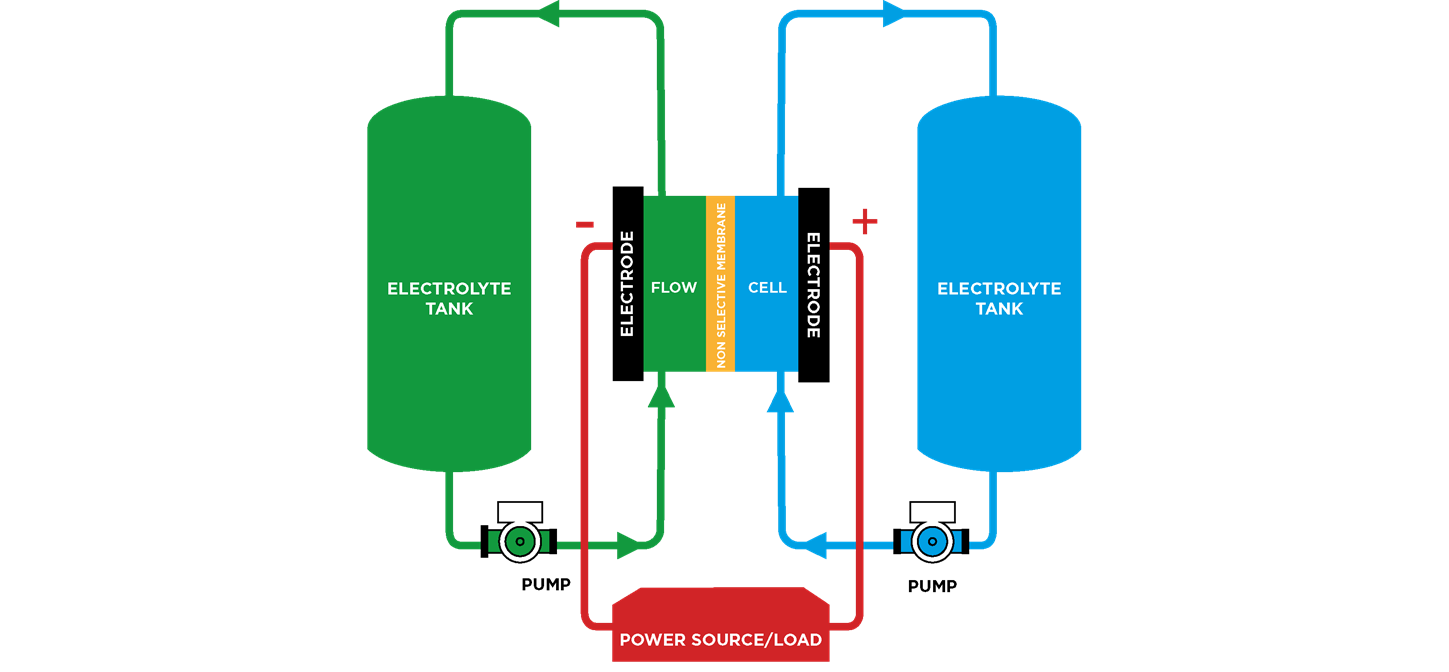As the world scales up on secure, clean and affordable energy generated from renewables, there is an increasing requirement for large-scale energy storage systems that are able to efficiently store and release power when required.
One of the most promising technologies capable of storing renewable energy on a large scale, are flow batteries. With an operational time of up to 12 hours, they offer the capability of flexible, large scale energy storage, whilst also maintaining a consistent supply of energy derived from renewable sources making them well suited to electrical power grids, but are also attractive for users that require uninterrupted supply or back up power such as hospitals, manufacturers and offices.
Flow batteries have the potential to deliver the full benefit of renewable energy and ultimately, achieve commitments of Net Zero Goals.
What is a Flow Battery?
A flow battery is rechargeable and operates much like lithium-ion batteries, providing power to electrical devices. However, the way they create and store energy is quite different.
In a flow battery, the two liquid or gaseous reactants are contained in individual tanks which are situated separately from the cell where the reaction occurs, this arrangement gives layout flexibility. There are a number of different types of flow battery, including Vanadium, Zinc-Bromine and Hydrogen-Bromine, and the reactants differ in each.
In a Hydrogen Bromide flow battery the reactants are an aqueous hydrogen bromide electrolyte solution and hydrogen gas. The two reactants are pumped from the storage tanks through the system to the electrochemical cell, where the charge or discharge reaction occurs across a central membrane. In some flow batteries this reaction is accelerated by a precious metal catalyst.

In the case of a hydrogen-bromine flow battery during the charge reaction an electrical current (derived from renewable sources) converts hydrogen bromide (HBr) into a tribromide ion (Br3-) and hydrogen, In the discharge reaction the H2 releases 2 electrons to form 2 H+ ions which move across the membrane and Br3- is converted back into simple Br- which combines with the H+ to form HBr again. This fully reversible redox process means that the reactants are used but not consumed so the battery is a self-contained closed system and the reactants do not need replenishment.
Advantages of Flow Batteries as a Long-Duration Energy Storage Solution
As the increasing use of renewable energy inevitably drives the requirement for large scale energy storage, flow batteries offer a broad range of benefits making them a valuable asset in the energy transition:
Longer duration
Flow batteries have a typical duration of up to 12 hours, significantly longer than the 4 hours typically achieved by Lithium-Ion systems.
Consistent Supply
The long-duration storage of flow batteries means power from renewables can be stored and then distributed when needed to potentially support a future of 100% green energy.
Scalability
Within lithium-ion batteries, the cell size restricts the charge the battery can hold, whereas in a flow battery, you can engineer larger storage tanks enabling the use more electrolytes to meet the energy requirement. This flexibility enables a de-coupling of power and energy, which helps make robust battery systems.
Sustainability
Flow batteries can be constructed from low-cost and readily available materials, such as thermoplastics and carbon-based materials. These materials can all be recycled, with the electrolytes being recovered and reused, lowering their impact on the environment and offering a much cleaner alternative to their counterparts with lithium-ion batteries which are much harder to recycle.

TFP Hydrogen's Assistance in a Green Future
As a leader in green hydrogen technology manufacturing, we take great pride in being a part of the new tomorrow. We are specialists in electrochemical materials and supply a range of partners with high-quality materials designed for both established and emerging power generation and storage systems. For more information about our hydrogen products, feel free to enquire online, and one of our experts will get back to you.
